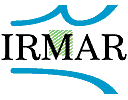Composition of the group (2008-2009)
Head: D. Pétritis
Professors emeriti :
J.-P. Conze, Y. Guivarc'h.
Professors :
B. Bekka,
L. Hervé (INSA), D. Pétritis,
A. Raugi,
A. Zorich.
Researchers (CNRS) : S. Cantat,
Y. de
Cornulier, S.
Gouëzel
Associate professors :
Y.
Coudène ,
S. Le Borgne, F. Maucourant
, O. Radulescu.
Post-doctoral fellow : T. Baumuratova
PhD fellows : A. Crudu, D. Guibourg, J.-R. Heu, A.K. Ka, J.B. Lim, B. de Loynes, J. Marco, A. Moncet, V. Noël, M. Roger, T. Sierocinski.
General presentation of the group and scientific context
Going back to the origins of ergodic theory of dynamical systems, it appears that ergodic theory stems from the original works on statistical mechanics of Boltzmann and Gibbs and of Poincaré. Ergodic hypothesis was first formulated for systems of particles, subject to known interactions and having known masses, evolving in a domain of the 3 dimensional space. In deterministic classical mechanics, the time evolution of the instant microscopic state of the system is described by the flow of a one-parameter transformations group (a dynamical system) acting on phase space and leaving invariant the natural measure of this space. Ergodic hypothesis is equivalent in stating that most of the trajectories are uniformly distributed on surfaces of constant energy of the phase space; moreover, asymptotically, it allows the replacement of time averages by spatial averages.
Starting from the rigorous framework established by the Birkhoff's theorem (1930), ergodic theory grew independently studying the asymptotic behaviour of dynamical systems (iteration of a given transformation or one-parameter flow) in terms of invariant measures. It covers both the deterministic case (dynamical systems defined in terms of differential equations for example) and, through martingale theory, the probabilistic case of stochastic processes (in particular Markov processes.)
The very notions of Lyapunov's exponents (characteristic exponents), symbolic coding, entropy, hyperbolicity (source of stochasticity and of chaotic behaviour for certain classes of dynamical systems) are the main milestones in the development of ergodic theory at the interface of probability theory, analysis, and geometry. The notions developed and involved in ergodic theory are powerful tools for other domains of mathematics, in particular, group theory and arithmetics.
The research of the group covers these subjects with an emphasis on ergodic and stochastic properties of transformations or processes (very often matrix valued.)
Beyond the strict probabilistic framework, methods of ergodic theory are applied to problems of geometric or arithmetic nature or to models stemming from mathematical physics. Natural interactions with other groups of the IRMAR have been developed, particularly with the group of analytic geometry and the group of stochastic processes and statistics. Moreover, numerous application are based on methods of ergodic theory: algorithmic problems of disordered media in physics, population dynamics and dynamical systems in biology, quantum information, and quantum cryptography in telecommunications.
Activities
A seminar
is held on Mondays 14:00-15:00. The programming and the schedule are
coordinated by F. Maucourant.
Topical meetings interesting researchers from other universities are
organised regularly.
Main research themes
Ergodic theory of dynamical systems
- Transfer operators, hyperbolic systems
- Quasi-periodic systems
- Ergodic theory in infinite measure
- Dynamics of diffeomorphisms on manifolds
- Networks of coupled mappings
![]() Ergodic geometry
Ergodic geometry
- Teichmüller flows
![]() Non-commutative groups action
Non-commutative groups action
- Dynamics of linear groups action
- Equidistribution
![]() Operator algebras and
non-commutative ergodic theory
Operator algebras and
non-commutative ergodic theory
- Von Neumann algebras
- C*-algebras
![]() Probability, random walks,
Markov chains
Probability, random walks,
Markov chains
- Products of random matrices
- Spectral methods
- Random walks in random environment
![]() Interdisciplinary applications
Interdisciplinary applications
- Systems biology, genomics
- Physics, quantum information and communication
- Medical signal processing
| Dernière mise à jour le
12.09.2008 |
© D. Pétritis, IRMAR |


